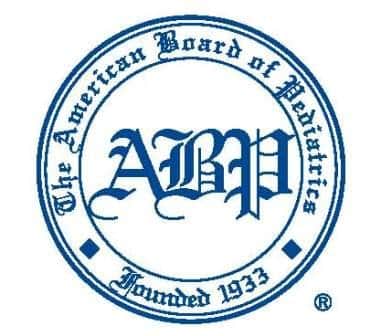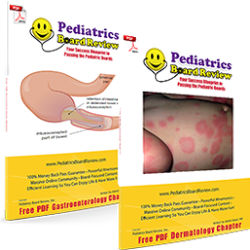A Board of Pediatrics Overview
ABP Exam Overviews
 The American Board of Pediatrics overview article was very well received by both pediatricians planning on taking the initial certification exam, as well as those preparing for the pediatric recertification exam. If you’re taking the recertification exam, you should definitely read the article and watch the video since it shows how you can get access to 200 free questions written by the ABP.
The American Board of Pediatrics overview article was very well received by both pediatricians planning on taking the initial certification exam, as well as those preparing for the pediatric recertification exam. If you’re taking the recertification exam, you should definitely read the article and watch the video since it shows how you can get access to 200 free questions written by the ABP.
In this article, I’ll share a general overview of the structure of the initial certification and recertification exams, and I’ll also share a ton of resources available to you within the Pediatrics Board Review website.
Initial Certification Exam Format
 The American Board of Pediatrics initial certification exam is definitely the harder exam of the two. Until 2012, the ABP pass rate was as low as 75%. The pass rate is now much higher, but you only have 7 years to pass after you graduate residency. If you don't, you have to repeat 1 year of residency in order to become board-eligible again.
The American Board of Pediatrics initial certification exam is definitely the harder exam of the two. Until 2012, the ABP pass rate was as low as 75%. The pass rate is now much higher, but you only have 7 years to pass after you graduate residency. If you don't, you have to repeat 1 year of residency in order to become board-eligible again.
The computer based, multiple choice exam contains between 332-336 questions, and is taken at one of the Prometric test centers. The exam is broken down into four blocks, with each lasting 1 hour 45 minutes. After each block you will be given the opportunity to take a 15-minute break before the start of the next session. I can’t stress to you enough how important it is to make use of the scheduled breaks, but also that you get your bottom back into your seat before the break ends. If you don’t, your exam will start without you!
Between blocks #2 and #3 the break lasts for an hour. You should use this time to eat a light and easily digestible meal, and also consider doing a brief review of some of your “trouble areas” (as long as that won’t freak you out).
Each 1 hour and 45 minute block contains 83-84 questions, which means you have about 1 minute and 15 seconds (or 75 seconds) to answer each question and move on. In another PBR article I talk further about how to keep pace during the exam, and how to make sure that you are on target to complete the exam in the allocated time.
After the exam, you’ll probably have a tear of joy, vomitus, or panic. Regardless, try to enjoy the freedom and give your family and friends lots of overdue attention.
You will receive the pediatric board scores about 2-3 months after the exam.
Pediatric Recertification Exam Format

The American Board of Pediatrics recertification exam (aka the pediatric MOC exam) is a much more straightforward multiple choice exam. BUT, in addition to the test, there are 3 additional parts to the exam. Here is a brief description of the 4 parts of the recertification process:
- PART ONE – Professional license
Applicants must hold a medical license in good standing
- PART TWO – Lifelong Learning and Self-Assessment
Designed to help pediatricians enhance their knowledge and practice skills. Self-assessments are generally available in the areas of Knowledge, Decision Skills and Subspecialty. You can elect to do 200 free ABP questions as part of this, AND you will receive pediatric Continuing Medical Education credits (CME) for doing so.
- PART THREE – Cognitive Expertise Secure Exam
This is the multiple choice, timed recertification exam that I’ll discuss in some more detail below.
- PART FOUR – Performance in Practice
This section allows pediatricians to demonstrate competence in systematic measurement and improvement in patient care.
The “test” portion of the pediatric recertification exam, like the general pediatrics exam, is taken at one of Prometric’s many testing centers. It consists of approximately 200 multiple choice questions which are divided into 2 blocks, each lasting 2 hours. You are able to take an optional 30-minute break after the first block. As with the Initial Certification exam, take advantage of the break, but get back to your desk at least 2-3 minutes before the time runs out.
Since September 1st, 2013, the ABP has altered the scoring system for the recertification exam to bring it in line with the other exams it administers. Scoring is now in 1-point increments, and there are 300 points available. A passing score is set at 180.
In general, the pass rate for the pediatric recertification exam is much higher than the initial certification boards. For pediatricians using the Pediatric Board Review (PBR) Ultimate Bundle Pack, the pass rate has been 100% from 2011 – 2033.
How to Study for the Pediatric Boards (Initial Certification Exam)

How you study for the boards depends on whether you’re a first-time test taker or someone who has already attempted the boards and failed.
In general, you should expect to spend around 3-400 hours studying. This includes going through the PBR 3-5 times and doing at least 750 practice questions.
Your greatest chance of passing is the first time you take the boards. In order to differentiate between strategies for first-timers and repeat test takers, I’ve put together two separate study schedules.
- Study Schedule for first-timers
- Study schedule if you’ve ever failed the pediatric boards (or ANY medical board exam)
For the art of practicing questions, I recommend using AAP PREP questions. If cost is a concern, you can get a TON of questions from BoardVitals or Exam Master at a discount since you’re a PBR fan. You can also get over 700 MedStudy Pediatrics questions at a fraction of the price of the AAP PREP questions.
How to Study for the Pediatric Board Recertification Exam
 Again, this exam is much easier than the initial certification exam. While the content outline remains the same, I feel the emphasis is more on general pediatrics, and less on the pediatric subspecialty areas. However, a longstanding career in clinical medicine is NO substitution for reviewing a comprehensive study guide, such as the PBR.
Again, this exam is much easier than the initial certification exam. While the content outline remains the same, I feel the emphasis is more on general pediatrics, and less on the pediatric subspecialty areas. However, a longstanding career in clinical medicine is NO substitution for reviewing a comprehensive study guide, such as the PBR.
For the past three years, PBR Ultimate Bundle Pack members taking the MOC exam have had a 100% pass rate. Yes… 100%! It's something that I’m incredibly proud of, but I always emphasize the fact that these pediatricians made the correct decision by relying on a good board-focused study aid rather than relying on the American Academy of Pediatrics PREP materials (meant for CME, not the boards).
So, I highly recommend that you go through the PBR materials 2-3 times, and I recommend practicing your test-taking skills with at least 500 pediatric board review questions. Again, I typically recommend AAP PREP questions, but if expense is an issue then PBR discounts are available for BoardVitals and Exam Master. Also, the cost for MedStudy pediatrics questions is quite reasonable.
Did that help?
For anyone who follows my recommendations to the letter, they should have a GREAT chance of passing the boards. For first-time test takers, I even offer a 100% money back guarantee.
Did you find this article useful? If so, please click the Facebook “LIKE” button on this page or click the SHARE button and send this article to a friend.
If you have any questions or comments about this article, I would love to hear them. Simply leave a comment below and I promise I’ll see it.

Watch Your Free Video Training Session Now
Learn HOW to Answer Board Style Questions &
Be a Better Test Taker



